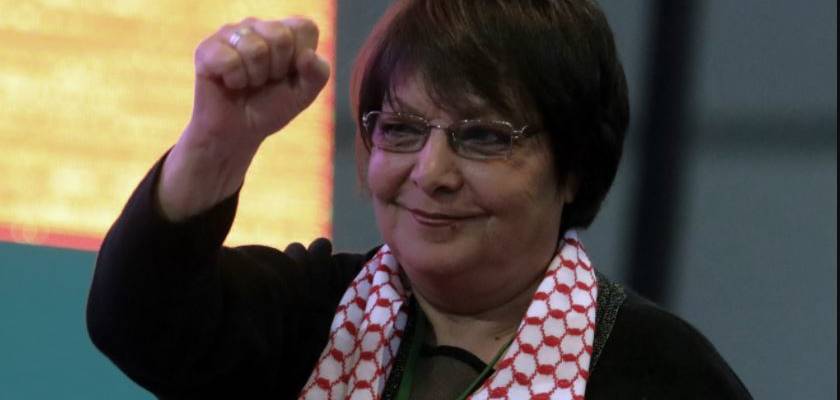“The grievance committee that concluded that Professor Abdulhadi’s academic freedom was impinged upon, did so based on a false dichotomy— either host Khaled or silence the Palestinian voice,” attorney Brooke Goldstein stated.
By Atara Beck, United with Israel
Palestinian terrorist Leila Khaled, a leading member of the Popular Front for the Liberation of Palestine (PFLP) – designated as a terrorist organization in the US, the European Union, Canada and Israel – was scheduled to appear at a San Francisco State University (SFSU) Zoom event in September of last year, but due to grassroots activism, the program was cancelled at the 11th hour.
“Whose Narratives? Gender, Justice and Resistance: A Conversation with Leila Khaled” was the title of the address that the unrepentant terrorist, who participated in the hijacking of a Tel Aviv-bound commercial flight in 1969, was planning to give.
The event was organized by SFSU’s Department of Arab and Muslim Ethnicities and Diasporas Studies, headed by virulently anti-Israel and pro-terror Prof. Rabab Abdulhadi.
However, on Thursday, a three-member faculty panel at the university upheld a grievance filed by Abdulhadi, ruling that the school violated the scholar’s academic freedom by cutting off the event because it featured an affiliate of the Popular Front for the Liberation of Palestine (PFLP), The Algemeiner reported.
The online seminar, which briefly streamed live on YouTube in Sept. 2020 before the service provider cut its feed, had been denied a platform by both Zoom and Facebook.
The Faculty Hearing Committee at SFSU said that school officials violated the academic freedom of Abdulhadi by “not providing adequate support” to the organizers of the event, and that they had caused “mental health stress,” according to The Algemeiner.
The panel called on SFSU to issue a public apology to the professor and to issue a “public letter of support of faculty with regards to academic freedom,” as well as providing a venue for rescheduling the event.
SFSU President Lynn Mahoney now has three weeks to either uphold or veto the committee’s decision, according to The Electronic Intifada. If she chooses the veto option, Abdulhadi’s complaint will go to legal arbitration.
“This is a huge victory not only for us, but for everybody speaking about Palestine and for our ability to teach about Palestine as part of the indivisibility of justice,” Abdulhadi on Thursday told The Electronic Intifada, an online platform that publishes viciously anti-Israel and antisemitic articles, promoting BDS campaigns.
A HUGE victory for academic freedom and for Palestine. The faculty panel in a 9/30 grievance hearing rules @SFSU FAILED to protect @AbdulhadiRabab and Tomomi Kinukawa ‘s academic freedom by providing an alternative platform in lieu of @Zoom’s fascistic cancellation (1)
— #SaveSilwan#SaveSheikhJarrahOmarZahzah (@dromarzahzah) October 14, 2021
“After the pain and the anguish for over a year that we have suffered, by being vilified by character assassinations, by being chased by Zionists, by the hate mail, by all the nastiness that has happened, by the fact that our university did not have our backs, we were vindicated,” he told the site.
“The good news is that we have a huge movement of everybody coming together within San Francisco State, within California, within the US, internationally – we’re fighting for justice and for Palestine, and we see it as part of justice for all,” he said.
‘Downright Dangerous’ for Jewish Students
“Hosting a State Department-recognized hijacker and leader of a terrorist organization on campus, who espouses the killing of civilian Jews as a legitimate form of communication about Palestinian issues, does not serve academic freedom,” Brooke Goldstein, founder and director of The Lawfare Project, told United with Israel. “It is downright dangerous and creates safety issues for the Jewish community on campus.
“The fact that the university did not swiftly and decisively shut down the event, but instead openly voiced its support for it, demonstrates a massive failure on behalf of the university to protect the safety and security of its Jewish students.
“The grievance committee that concluded that Professor Abdulhadi’s academic freedom was impinged upon, did so based on a false dichotomy— either host Khaled or silence the Palestinian voice,” Goldstein said.
“But there exists a plethora of ways to advocate for Palestinians without hosting an event with a convicted terrorist that endangers the safety and security of Jewish students on campus. Unfortunately, the committee conflates academic freedom with supporting speech that is not protected by the First Amendment because it tramples on the rights of others.”
